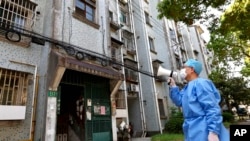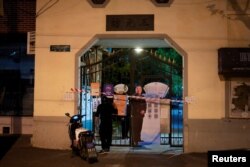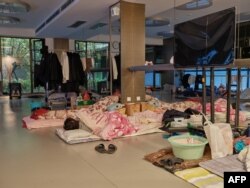Mass testing. Snap lockdowns. Extensive quarantines. That's life for residents of Shanghai, and there's no end in sight.
In the third week of draconian COVID-19-containment restrictions, almost 26 million residents of China's most populous city and financial powerhouse are far beyond fed up and bordering on furious. As the highly contagious omicron variant circulates, they're wondering what comes next.
By Tuesday, Shanghai authorities were backtracking on a statement made a day earlier promising to loosen some restrictions. While pivoting, they maintained that the country's zero-tolerance approach to COVID-19 was working, despite the increase in cases in Shanghai and throughout China.
Yet recent deaths at nursing homes, a ban keeping people with non-COVID-related illnesses from hospitals, widespread food shortages and a negative impact on businesses are testing the limits of China's zero-COVID approach in Shanghai.
Mo Du, or Magic City, as Shanghai is called, may not necessarily break Beijing's zero-tolerance policy, but what is happening in the city has come under increased scrutiny and criticism from the general public, according to analysts.
Multiple patients have died at the Shanghai Donghai Elderly Care Hospital, according to relatives of patients, with estimates from a variety of sources ranging from 20 to 500. The government-owned care center is the largest nursing home in the city, with 1,800 beds.
The Associated Press interviewed patients' relatives who said care for their family members with COVID-19 deteriorated as authorities quarantined staffers who came in contact with infected residents.
Yue Ge, an independent journalist with a YouTube channel on current affairs, has been in contact with the patients' relatives. He told VOA Mandarin that the first COVID-19 cases at the nursing home appeared early in March.
"As of March 26, 80% of medical staff and care workers had been transferred," he said. "This means that many patients do not have access to basic care and treatment. Some relatives of patients have clearly raised the possibility that their loved ones died of starvation."
He added that patients who tested positive were transferred to hospitals or quarantine centers ill-suited for providing eldercare.
Larry Lang, a well-known Taiwan-born economist who lives in Shanghai, posted on China's Twitter-like platform Weibo that his 98-year-old mother who suffered from kidney problems died because of a care delay. Required to show a negative COVID-19 test to receive needed treatment, she died waiting for results.
"After four hours of waiting at the door of the hospital emergency room, my mom left me forever," he wrote.
"I wanted to see my mother for the last time, but because of quarantine policy, it took me a long time to communicate with the relevant departments to be allowed to travel to the hospital.
"Then, I was standing in the middle of the road and couldn't get a taxi. Because of the lockdown, I didn't get to see my mom one last time. I hope this tragedy doesn't repeat itself," he added.
According to the Shanghai Municipal Health Commission, the city has reported more than 250,000 cases as of April 13 since the outbreak began on March 1. No deaths have been recorded, and the commission claims that only one case has been found to be severe enough for treatment. It says most of the cases are mild or asymptomatic.
Online, netizens are questioning the death toll.
"The death number should include those who lost their lives because they have no access to emergency care," one said.
"I just don't understand one thing: A patient needs to obtain a negative COVID test to be able to go to the emergency room. So if one tests positive, what happens?" another read.
"Inhumane policies, inhumane policy makers," said a third.
The Associated Press quoted a city health official, speaking on condition of anonymity, that "the criteria for confirming cases and deaths are very strict and susceptible to political meddling."
Scott Gottlieb, who served as commissioner of the U.S. Food and Drug Administration from 2017 to 2019 and is now on the board of vaccine maker Pfizer Inc., told CNBC's "Squawk Box" on Monday that he's skeptical of Shanghai's reported numbers.
"The data coming out of there is implausible," he said. "They claim … only one severe case and no deaths. We know that's not true."
Deputy Secretary-General of the Shanghai government Gu Honghui said on Monday that officials had relaxed quarantine rules in more than 7,000 lowest-risk areas because those neighborhoods recorded zero cases of omicron over the past 14 days. The decision meant residents were allowed to move around in their neighborhoods and go shopping.
Yet on Tuesday, residents of the neighborhoods reported that authorities told them that even in these low-risk areas, "no one should go out unless absolutely necessary."
The city added 22,342 new cases on Tuesday, 994 of them symptomatic cases, according to the Shanghai Municipal Health Commission. The daily infection rate remained above 20,000 for the sixth straight day.
Experts say Shanghai's combination of changing regulations and the infection rate suggest China is unlikely to relax its strict COVID-19 policies anytime soon.
Yu Ping, an independent scholar and a former senior fellow at New York University's U.S.-Asia Law Institute in New York City, told VOA Mandarin that while a number of medical professionals have been advocating for more relaxed quarantine measures — such as allowing home quarantine for the asymptomatic — Beijing remains wedded to its zero-tolerance policy.
"The thing is that the zero-tolerance policy has shifted from a pandemic control policy to a political goal. This has become Xi Jinping's political capital," he said, referring to China's president.
Dr. Ho Mei-Shang, an adjunct research fellow at the Institute of Biomedical Sciences of Taiwan's research institute Academia Sinica, told VOA Mandarin that the government should quickly provide effective vaccines for older people and those with chronic diseases. According to the latest statistics, only 62% of those aged 60 and older in Shanghai have been vaccinated.
"A quarantine should be a temporary measure to provide better pandemic control measures. If Beijing doesn't change its strategy, even if they manage to control this wave of the infection, there will be the next wave," she said.
"It's not that we want to coexist with the virus, but the virus has decided to coexist with us," Ho added. "It's impossible to live in a cocoon."
VOA's Gao Feng and Jin Gu contributed to this report.








